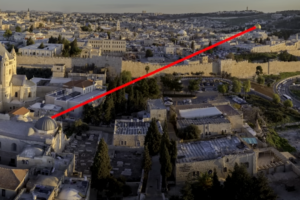Jesus and the apostles did not inaugurate another religious system but the age of the kingdom of God. As we examine the gospels and the book of Acts, the main theme of the preaching was the kingdom of God—not the church and not a religion.
The church is not the kingdom but the main agent of the kingdom to represent God and manifest His government in the earth realm. In spite of this fact, many churches and denominations have historically bypassed Scripture and created a secondary tradition that is nowhere close to the way of Jesus and the apostles. I believe the time is presently at hand in which God is shaking the global church and establishing kingdom principles.
God is ripping away extraneous second-tier traditions that are opposed to His kingdom—irrespective of denominational affiliation. It is important for believers to understand the difference between characteristics of the kingdom and religion. The world will only be transformed through His kingdom.
The following are 16 contrasts between the kingdom age and religious systems:
1. In the kingdom, the focus is on manifesting God in the earth; in religion, the focus is on applying their traditions inside church buildings. Just the term kingdom implies both a king and his domain. Psalm 24:1 teaches us that the earth belongs to the Lord and Psalm 22:28 says that His kingdom rules over all nations—not just over the church. Consequently, we in His kingdom (Col. 1:12,13) are called to manifest His rule in the whole earth—not just the church realm.
2. In the kingdom, the individual transforms from within; in religion, the focus is on observing outward rituals. Jesus taught us in Matthew 5-7 and 23 that God requires truth in the inner man. (Read also Psalm 51:6.) Hence, the kingdom focuses on inside out transformation (Luke 17:21) while religion focus primarily on observing rituals during church services.
3. In the kingdom, all believers are released to the work of the ministry; in religion, merely professional clergy are released to minister. In the kingdom, all believers are both kings and priests (Rom. 5:17; 1 Pet. 2:8-9). In religion, only those trained in seminary and make a living in church ministry are called priests.
4. In the kingdom, the Spirit is poured out upon all flesh; in religion, the Spirit only moves during Sunday services. The apostle Peter made it clear in Acts 2:17 that the resurrection inaugurated the kingdom age in which the Holy Spirit was poured out upon every culture, tribe, kindred, tongue and nation. He was not just for the religious Jews anymore, and His Spirit was no longer restricted to the Most Holy Place in their temple. In spite of this, many in the body of Christ still believe the Holy Spirit only shows up within the four walls of a building during mass or church services.
5. In the kingdom, the Scriptures have primary ecclesiastical authority; in religion, second-tier religious tradition has primary ecclesial authority. This is an issue not only for the Roman Catholic Church (who put tradition and canon law on equal terms as Scripture) and the Orthodox Church (in which many place the writings of the apostolic fathers on an equal level to the Holy Scriptures). Many evangelical Protestant denominations also have their own second-tier traditions that have primary authority regarding Christian practice. (Too many denominations to name do this—both Pentecostal and non-Pentecostal.)
6. In the kingdom, the presence of God is wherever the believer goes; in religion, the presence of God is at the altar of their church building. In the kingdom, (as shown in the Gospels and the book of Acts) the power and presence of God to heal, deliver and save the oppressed was manifested more in the streets than in the synagogue or the temple. God wants to unleash an army of believers who will turn the world upside down, but religion wants to keep believers closeted inside church buildings.
7. In the kingdom, the five-fold minister equips the saints to do the work of the ministry; in religion, the five-fold minister does the work of the ministry. Traditional religious systems keep the people dependent upon professional clergy to pray for the sick, counsel, preach, and represent God to the world. In the kingdom, five-fold ministry gifts are focused not on doing the work of the ministry but equipping the saints to do the work of the ministry (Eph. 4:11-12).
8. In the kingdom, the ministry focus is Monday through Friday; in religion, the ministry focus is Sunday. Those participating in kingdom focused churches cannot wait until Monday; those trapped in religious systems only see purpose and meaning during church services.
9. In the kingdom, the church is sent to serve their community; in religion, the church merely attempts to get the community into their church. Kingdom-focused churches equip believers to be the problem-solvers of society. They equip them with a biblical worldview to frame their service in every vocation that affects communities. In the kingdom, it is not merely about how many people attend the church services, but how many in the church are sent out to transform their world!
10. In the kingdom, the burden is for the whole body of Christ; in religion, their burden is for their own denomination and local church. Any person or leader with a kingdom agenda will have a concern for the health of the whole body of Christ—irrespective of their denomination. Those with a religious mindset are sectarian and only care about the health of their own denomination and or church.
11. In the kingdom, every believer is a priest; in religion, only the professional clergy serve as priests. In the kingdom of God, every believer is part of the hierarchy of God as His representative. In religion, the only ones recognized in the priesthood are the trained professional clergy.
12. In the kingdom, every sphere of life is integrated under King Jesus; in religion, the church stays out of the public square. The kingdom of God integrates the rule of God with societal structures such as law, politics, economics, families, art, and business. In religion, politics and economics are unspiritual and should be left to the world.
13. In the kingdom, Jesus is the King of kings; in religion, He is merely the symbolic leader of the church. In the kingdom, Jesus is not only the head of the church but the King of kings (Rev. 19:16)—this is the most politically charged statement anyone can make about Jesus! This means that Jesus is the political head of every president and politician, as well as the governor of every governor and the mayor of every mayor. This obligates every believer to be politically active by voting and doing their part to speak truth to power, as well as promote candidates who best represent kingdom values.
14. In the kingdom, the church is the salt of the earth; in religion, the believer is the salt of the church. Jesus called His followers the salt of the earth and the light of the world, not the salt of the church and the light of their religion.
15. In the kingdom the focus is on transforming the earth; in religion, the focus is on perpetuating its traditions in the church. Every person in a kingdom-focused church should understand that the Great Commission (Matt. 28:19) involves teaching whole nations—not just individuals. Those stuck in religious systems only work to perpetuate the second-tier traditions of their church to other church people.
16. In the kingdom, culture is engaged; in religion, disengagement and escape from the earth is desired. The nature of religion is that it wants to create its own enclave of safety from the unpredictable realities of the unredeemed world. Religion is mystical—not practical or spiritual. However, those trained in the kingdom view every earthly challenge as an opportunity to be a problem solver and bring Christ in culture.
May God help all of us discern whether we are primarily informed by the kingdom or by a religious tradition and system.
Joseph Mattera has been in full-time church ministry since 1980 and is currently the presiding bishop of Christ Covenant Coalition and overseeing bishop of Resurrection Church in New York. He is also serving as the United States ambassador for the International Coalition of Apostles and as one of the founding presiding bishops of the International Communion of Evangelical Churches.
See an error in this article?
To contact us or to submit an article























